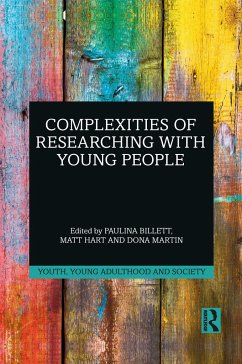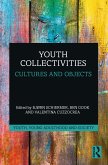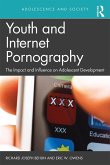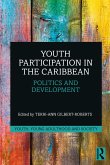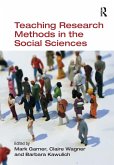Complexities of Researching with Young People
Herausgeber: Billett, Paulina; Martin, Dona; Hart, Matt
Complexities of Researching with Young People
Herausgeber: Billett, Paulina; Martin, Dona; Hart, Matt
- Broschiertes Buch
- Merkliste
- Auf die Merkliste
- Bewerten Bewerten
- Teilen
- Produkt teilen
- Produkterinnerung
- Produkterinnerung
Currently, most books on youth research available on the market focus on â how toâ conduct youth research, or the research process itself. This edited collection proposes to take this process a step further and discuss the complexities of youth research from a practical and theoretical context.
Andere Kunden interessierten sich auch für
![Young Refugees and Forced Displacement Young Refugees and Forced Displacement]() Liliana RigaYoung Refugees and Forced Displacement37,99 €
Liliana RigaYoung Refugees and Forced Displacement37,99 €![Researching Marginalized Groups Researching Marginalized Groups]() Researching Marginalized Groups37,99 €
Researching Marginalized Groups37,99 €![Youth Collectivities Youth Collectivities]() Youth Collectivities37,99 €
Youth Collectivities37,99 €![Youth and Internet Pornography Youth and Internet Pornography]() Richard BehunYouth and Internet Pornography30,99 €
Richard BehunYouth and Internet Pornography30,99 €![Youth Participation in the Caribbean Youth Participation in the Caribbean]() Youth Participation in the Caribbean123,99 €
Youth Participation in the Caribbean123,99 €![Beyond Resistance! Youth Activism and Community Change Beyond Resistance! Youth Activism and Community Change]() Julio Cammarota / Shawn Ginwright (eds.)Beyond Resistance! Youth Activism and Community Change79,99 €
Julio Cammarota / Shawn Ginwright (eds.)Beyond Resistance! Youth Activism and Community Change79,99 €![Teaching Research Methods in the Social Sciences Teaching Research Methods in the Social Sciences]() Teaching Research Methods in the Social Sciences63,99 €
Teaching Research Methods in the Social Sciences63,99 €-
-
-
Currently, most books on youth research available on the market focus on â how toâ conduct youth research, or the research process itself. This edited collection proposes to take this process a step further and discuss the complexities of youth research from a practical and theoretical context.
Hinweis: Dieser Artikel kann nur an eine deutsche Lieferadresse ausgeliefert werden.
Hinweis: Dieser Artikel kann nur an eine deutsche Lieferadresse ausgeliefert werden.
Produktdetails
- Produktdetails
- Youth, Young Adulthood and Society
- Verlag: Taylor & Francis Ltd
- Seitenzahl: 278
- Erscheinungstermin: 30. Juni 2021
- Englisch
- Abmessung: 234mm x 156mm x 15mm
- Gewicht: 428g
- ISBN-13: 9781032084619
- ISBN-10: 1032084618
- Artikelnr.: 62149696
- Herstellerkennzeichnung
- Produktsicherheitsverantwortliche/r
- Europaallee 1
- 36244 Bad Hersfeld
- gpsr@libri.de
- Youth, Young Adulthood and Society
- Verlag: Taylor & Francis Ltd
- Seitenzahl: 278
- Erscheinungstermin: 30. Juni 2021
- Englisch
- Abmessung: 234mm x 156mm x 15mm
- Gewicht: 428g
- ISBN-13: 9781032084619
- ISBN-10: 1032084618
- Artikelnr.: 62149696
- Herstellerkennzeichnung
- Produktsicherheitsverantwortliche/r
- Europaallee 1
- 36244 Bad Hersfeld
- gpsr@libri.de
Paulina Billett is a lecturer in sociology at La Trobe University, Victoria. Her research explores questions of wellbeing, identity formation and lived experience with a focus on women and young people. Matt Hart is a lecturer in digital society at the University of Leicester. His research interest is the sociology of youth and digital culture. Dona Martin is an adjunct researcher at La Trobe University, Bendigo, Victoria. Dona's portfolio includes a broad area of research in education.
1. Complexities of Researching with Young People: Conceptualising Key
Issues; 2. Researching the Lives of Young M¿ori in Aotearoa New Zealand:
Creating Culturally Sensitive Methods and Theory; 3. Doing Research in
Organisations: Implications of the Different Definitions of Youth; 4. They
Look Before They Leap: Conceptualising Young People as Digitally Competent
Risk-Takers, and its Implications for Ethical Internet Research; 5.
Critical Reflections: Merits of Using Youth-Centric Technology in Keeping
Young People Safe Across Europe; 6. Digital Modes of Data Collection in
Mixed-Methods Longitudinal Youth Research; 7. Revealing Intimacy through
Digital Media: Young People, Digital Culture and New Research Perspectives;
8. Researching Young People's Experiences: An African-Centred Perspective
of Consent and Ethics; 9. Working with Complexity: Between Control and Care
in Digital Research Ethics; 10. Informed Consent as a Situated Research
Process in an Ethnography of Incarcerated Youth in Denmark; 11. The Undue
Burden of Methodological Warrant on the Voice of Disengaged Young People;
12. Critically Examining Participation, Power, Ethics, and the
Co-construction of Knowledge in a Community-Based Photovoice Research
Project with LGBTQ Former Foster Youth; 13. Participation, Positionality
and Power: Critical Moments in Research with Service-Engaged Youth; 14.
Participatory Research and Political Ecology: An Evaluation of Research
with Young Syrian Refugees in Turkey; 15. Youth in Voice: The Concept of
Voice; 16. How Contradictory Friendships Disrupted My Study of
Working-Class Girls' Residential Instability; 17. The Multicultural Youth
Australia Census: Reading Complexity and Migrant Youth Citizenship into
Survey Methods; 18. The Pressures of Building Reciprocal Relationships in
an Intergenerational Research Team.
Issues; 2. Researching the Lives of Young M¿ori in Aotearoa New Zealand:
Creating Culturally Sensitive Methods and Theory; 3. Doing Research in
Organisations: Implications of the Different Definitions of Youth; 4. They
Look Before They Leap: Conceptualising Young People as Digitally Competent
Risk-Takers, and its Implications for Ethical Internet Research; 5.
Critical Reflections: Merits of Using Youth-Centric Technology in Keeping
Young People Safe Across Europe; 6. Digital Modes of Data Collection in
Mixed-Methods Longitudinal Youth Research; 7. Revealing Intimacy through
Digital Media: Young People, Digital Culture and New Research Perspectives;
8. Researching Young People's Experiences: An African-Centred Perspective
of Consent and Ethics; 9. Working with Complexity: Between Control and Care
in Digital Research Ethics; 10. Informed Consent as a Situated Research
Process in an Ethnography of Incarcerated Youth in Denmark; 11. The Undue
Burden of Methodological Warrant on the Voice of Disengaged Young People;
12. Critically Examining Participation, Power, Ethics, and the
Co-construction of Knowledge in a Community-Based Photovoice Research
Project with LGBTQ Former Foster Youth; 13. Participation, Positionality
and Power: Critical Moments in Research with Service-Engaged Youth; 14.
Participatory Research and Political Ecology: An Evaluation of Research
with Young Syrian Refugees in Turkey; 15. Youth in Voice: The Concept of
Voice; 16. How Contradictory Friendships Disrupted My Study of
Working-Class Girls' Residential Instability; 17. The Multicultural Youth
Australia Census: Reading Complexity and Migrant Youth Citizenship into
Survey Methods; 18. The Pressures of Building Reciprocal Relationships in
an Intergenerational Research Team.
1. Complexities of Researching with Young People: Conceptualising Key
Issues; 2. Researching the Lives of Young M¿ori in Aotearoa New Zealand:
Creating Culturally Sensitive Methods and Theory; 3. Doing Research in
Organisations: Implications of the Different Definitions of Youth; 4. They
Look Before They Leap: Conceptualising Young People as Digitally Competent
Risk-Takers, and its Implications for Ethical Internet Research; 5.
Critical Reflections: Merits of Using Youth-Centric Technology in Keeping
Young People Safe Across Europe; 6. Digital Modes of Data Collection in
Mixed-Methods Longitudinal Youth Research; 7. Revealing Intimacy through
Digital Media: Young People, Digital Culture and New Research Perspectives;
8. Researching Young People's Experiences: An African-Centred Perspective
of Consent and Ethics; 9. Working with Complexity: Between Control and Care
in Digital Research Ethics; 10. Informed Consent as a Situated Research
Process in an Ethnography of Incarcerated Youth in Denmark; 11. The Undue
Burden of Methodological Warrant on the Voice of Disengaged Young People;
12. Critically Examining Participation, Power, Ethics, and the
Co-construction of Knowledge in a Community-Based Photovoice Research
Project with LGBTQ Former Foster Youth; 13. Participation, Positionality
and Power: Critical Moments in Research with Service-Engaged Youth; 14.
Participatory Research and Political Ecology: An Evaluation of Research
with Young Syrian Refugees in Turkey; 15. Youth in Voice: The Concept of
Voice; 16. How Contradictory Friendships Disrupted My Study of
Working-Class Girls' Residential Instability; 17. The Multicultural Youth
Australia Census: Reading Complexity and Migrant Youth Citizenship into
Survey Methods; 18. The Pressures of Building Reciprocal Relationships in
an Intergenerational Research Team.
Issues; 2. Researching the Lives of Young M¿ori in Aotearoa New Zealand:
Creating Culturally Sensitive Methods and Theory; 3. Doing Research in
Organisations: Implications of the Different Definitions of Youth; 4. They
Look Before They Leap: Conceptualising Young People as Digitally Competent
Risk-Takers, and its Implications for Ethical Internet Research; 5.
Critical Reflections: Merits of Using Youth-Centric Technology in Keeping
Young People Safe Across Europe; 6. Digital Modes of Data Collection in
Mixed-Methods Longitudinal Youth Research; 7. Revealing Intimacy through
Digital Media: Young People, Digital Culture and New Research Perspectives;
8. Researching Young People's Experiences: An African-Centred Perspective
of Consent and Ethics; 9. Working with Complexity: Between Control and Care
in Digital Research Ethics; 10. Informed Consent as a Situated Research
Process in an Ethnography of Incarcerated Youth in Denmark; 11. The Undue
Burden of Methodological Warrant on the Voice of Disengaged Young People;
12. Critically Examining Participation, Power, Ethics, and the
Co-construction of Knowledge in a Community-Based Photovoice Research
Project with LGBTQ Former Foster Youth; 13. Participation, Positionality
and Power: Critical Moments in Research with Service-Engaged Youth; 14.
Participatory Research and Political Ecology: An Evaluation of Research
with Young Syrian Refugees in Turkey; 15. Youth in Voice: The Concept of
Voice; 16. How Contradictory Friendships Disrupted My Study of
Working-Class Girls' Residential Instability; 17. The Multicultural Youth
Australia Census: Reading Complexity and Migrant Youth Citizenship into
Survey Methods; 18. The Pressures of Building Reciprocal Relationships in
an Intergenerational Research Team.

